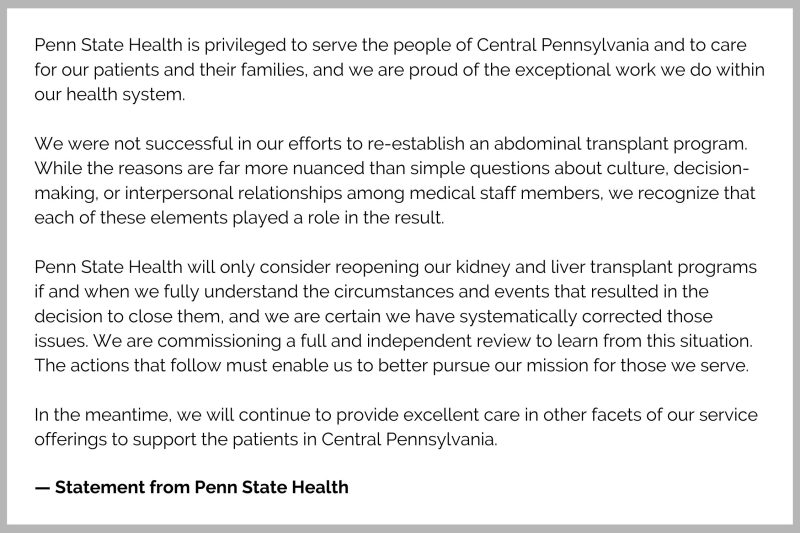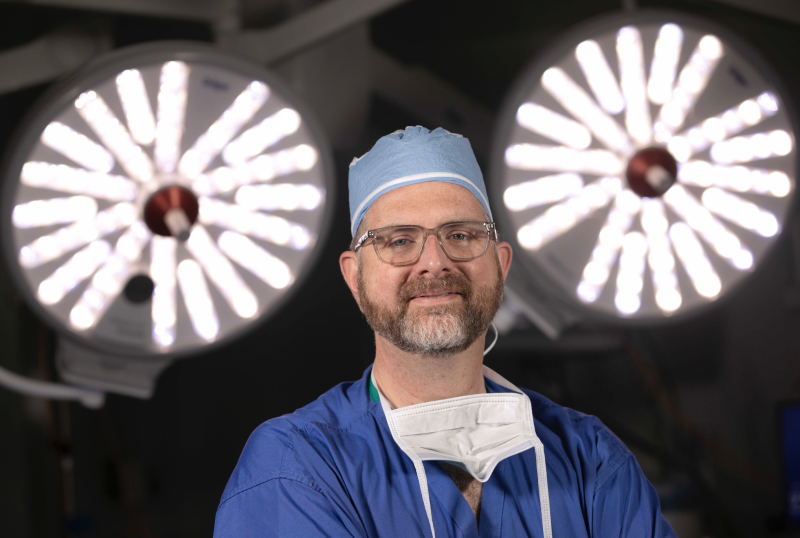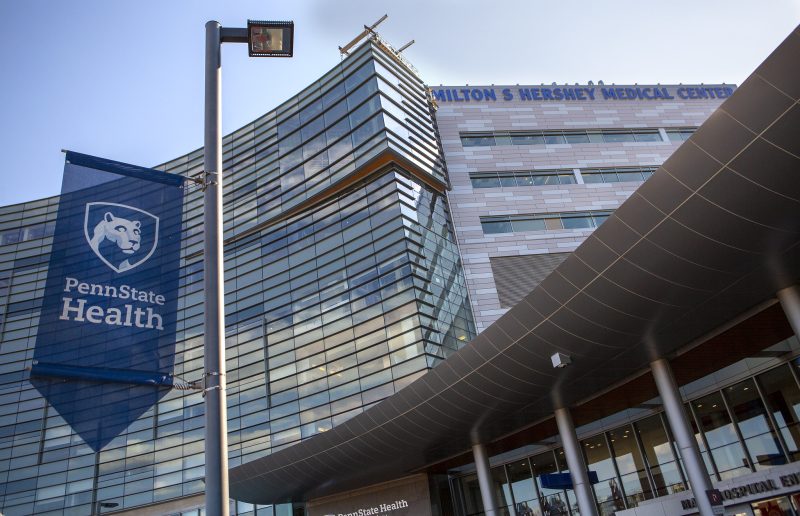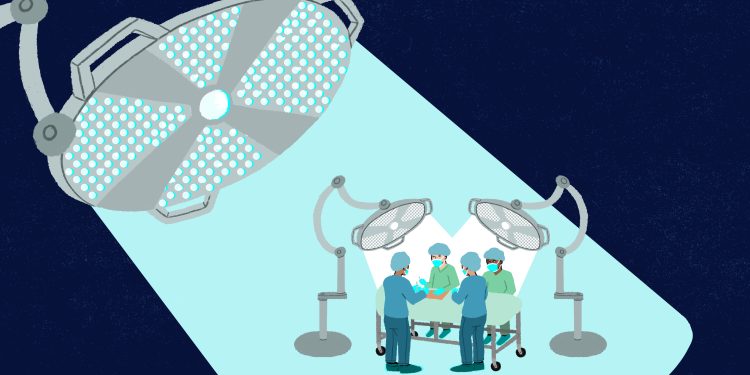Raymond Lynch documented what he thought were serious problems with Hershey Medical Center’s kidney and liver transplant programs. He was dismissed by Penn State Health just weeks before a federal review.
Wyatt Massey of Spotlight PA State College and Charlotte Keith of Spotlight PA
This story was produced by the State College regional bureau of Spotlight PA, an independent, nonpartisan newsroom dedicated to investigative and public-service journalism for Pennsylvania. Sign up for our north-central Pa. newsletter, Talk of the Town, at spotlightpa.org/newsletters/talkofthetown.
By the time he was told to leave the hospital, Raymond Lynch had nearly run out of people to warn.
He had warned staff in the transplant unit and fellow surgeons. He had warned his boss.
He had even taken his concerns to at least two top Penn State Health leaders.
Lynch compiled data showing what he thought were serious problems in the kidney and liver transplant programs at Milton S. Hershey Medical Center.
Patients were dying while waiting for a liver transplant, or becoming too sick to undergo the procedure, at what he considered an alarmingly high rate. So few patients were receiving kidney transplants that he worried regulators would intervene. He thought the way the program was being run was costing some patients a chance at a potentially lifesaving operation.
And some who received transplants were experiencing dangerous and potentially avoidable complications afterward, Lynch argued.
Lynch is not one to mince words. He can be a lightning rod for controversy, especially when he rails against the failures of the national transplant system. But he is also the kind of doctor who does not balk at an hourslong drive to meet a patient. Former colleagues described him as willing to speak up, even at great personal cost.
The surgeon was hired in early February 2023, during Penn State Health’s push to resurrect its troubled kidney and liver transplant programs. In 2022, the health system drew a rare public rebuke from the national body that oversees transplants, which criticized the hospital’s patient safety standards, processes for troubleshooting issues, and internal culture. As the health system worked to address the issues, the CEO told regulators that the transplant programs would strive to become the best in the state — if not the entire country.
Part of Lynch’s role, in his new job as “director of transplant quality and outcomes,” was to flag problems.
In Hershey, he thought, there were plenty.
Even before any incisions are made, transplants are a complex medical procedure. Transplant patients are often very sick. Some deaths and complications are unavoidable, which is why experts emphasize the need for hospitals to identify issues and find solutions. A crucial part of that, they say, is a work environment where employees can bring up problems without fear of personal blowback.
Lynch voiced his concerns in department meetings for months, colleagues recall. When those efforts seemed to go nowhere, he shared his findings with top Penn State Health officials, including Chief Operating Officer Deborah Addo and Hershey’s Chief Medical Officer Robert Harbaugh, four people told Spotlight PA.
Weeks later, in April, Penn State Health abruptly dismissed Lynch.
Penn State University, the majority owner of the health system and its flagship hospital in Hershey, has struggled for years with the perception that employees who report problems are punished. In 2022, after spending two days in Hershey, a team of regulators concluded that Penn State Health’s abdominal transplant unit had a “toxic culture of fear and retaliation.”
Lynch’s ouster sparked outrage among some of his former colleagues, who saw it as evidence that this culture had not changed, according to records obtained by Spotlight PA and people with direct knowledge of the situation. Staff were told the move was prompted by financial constraints, but some told leaders they did not believe this explanation.
In a letter shared with top administrators, one physician argued that Lynch’s dismissal was “plain retaliation” for his attempts to “objectively review” data and patient outcomes. “The loss of Dr. Lynch will have a profound negative impact on direct patient care and program innovation,” another employee wrote.
The surgeon’s dismissal was the first shock in a wave of upheavals for the health system.
In the weeks that followed, federal regulators renewed their scrutiny of the central Pennsylvania program. Penn State Health temporarily stopped performing liver transplants. Kidney transplants were suspended several weeks later. Then, in May, the health system announced it would indefinitely shutter both programs, which could end the federal review.
It is not clear what specifically prompted the performance review, or Penn State Health’s decision to discontinue the programs.
The health system declined to make top officials available for interviews, including Addo, Harbaugh, Johnny Hong, chief of the division of transplantation, and Don McKenna, president of Hershey Medical Center. In a statement responding to Spotlight PA’s findings, a Penn State Health spokesperson said: “We were not successful in our efforts to re-establish an abdominal transplant program.”
The reasons for this were “far more nuanced” than culture, decision-making, and relationships between medical staff members, although each of these played a role, the spokesperson said. The spokesperson did not specify what the other reasons were. The health system is commissioning a “full and independent review” to understand the underlying problems, and will only consider reopening the kidney and liver transplant programs once those have been “systematically corrected,” the spokesperson continued.

In May, following the closure of the programs, Penn State Health told staff in an email that Hong planned to resign. Reached by phone, he declined to comment for this story. Spotlight PA sent him a summary of findings via certified letter, but did not receive a response.
Lynch’s attorney said the surgeon would not comment or answer questions for this story.
Spotlight PA spoke with more than 20 people with expertise in the transplant industry or directly connected to Penn State Health’s abdominal transplant program, including current and former employees. The current and former employees asked not to be named out of fear of retaliation. Information provided by sources and cited in this story was confirmed by others or through records obtained by Spotlight PA. The newsroom reviewed recordings of internal meetings, as well as hundreds of pages of documents, including financial records, transplant data reports, emails, and text messages.
In a memo obtained by Spotlight PA, Lynch wrote that “program leadership decisions are the direct cause of observed concerns, and program culture strongly discourages constructive change.”
Rebuilding a program
A photograph from early in Lynch’s time at Penn State shows the surgeon alongside two other newly hired colleagues, including Hong. Framed by bright operating room lights and heartbeat monitors, they stand with resolute smiles and their arms folded across their blue scrubs.
Their postures convey confidence — something Penn State Health’s abdominal transplant unit desperately needed.
As far back as 2008, inspectors with the Pennsylvania Department of Health repeatedly flagged problems with the health system’s kidney and liver transplant programs, including failures to properly protect patients and inform them of the medical and psychological risks of a transplant, records show.
Following these poor reviews, the hospital agreed to fix the issues. But the spring of 2022 marked a low point. State and federal officials identified serious problems with the abdominal transplant unit, leading Penn State Health to suspend liver and kidney transplants in late April 2022.
In September 2022, the Organ Procurement and Transplantation Network, which oversees transplants in the United States on behalf of the federal government, declared Hershey Medical Center a “member not in good standing.” It is one of the most serious disciplinary actions the regulatory body can take, and was the first such move against a hospital in more than 15 years.
“To make a member not in good standing, that usually happens when a program is being obstinate,” said Jason Smith, a heart surgeon at the University of California, San Francisco, who previously served on the Membership and Professional Standards Committee, which oversees transplant programs under the regulatory body. “They’re ignoring the MPSC’s recommendations or not being forthcoming with data.”
The move led to an unusual public airing of the programs’ failures. By design, the oversight group typically keeps nearly all of its deliberations and the reasons for corrective actions confidential. The disciplinary action was intended to provide public notice that Penn State Health had committed a major violation of the group’s policies or shown a serious lapse in patient safety or quality of care, the group said in a statement at the time. The regulator also noted “a culture of retaliation for reporting potential problems.”
Penn State Health leaders promised to rebuild.
Lynch, hired in February 2023, arrived in Hershey with an established national presence.
In 2018, as a surgeon at the Emory University School of Medicine in Atlanta, Lynch sharply criticized a proposed national rule that would have changed how donated livers are distributed. Emory called Lynch, who argued the change would make it harder for patients in rural and low-income areas to receive donated livers, an “abiding advocate.”

The federal government cited research Lynch worked on when it announced major changes to the regulation of nonprofits that recover organs from deceased donors and can receive taxpayer funds. Testifying before the U.S. Senate Committee on Finance last summer, Lynch urged lawmakers to require these organizations to be more transparent. He also described the federal contractor overseeing the nation’s network for transplantation as incompetent and self-serving.
Former colleagues described Lynch as a principled doctor who is direct to the point of being abrasive and unafraid to challenge authority.
“He is a passionate advocate for the vulnerable human being,” said Michael Englesbe, the chief of the transplant division at the University of Michigan. Lynch worked closely with Englesbe at Michigan while completing his graduate medical training there. “If he thinks the system is screwing somebody, then he will do his homework and build the case.”
In a joint statement, four anesthesiologists at Emory — Philip Kalarickal, Gaurav Patel, Susan Smith, and Cinnamon Sullivan — who worked closely with Lynch in the transplant unit and the operating room, described him as “a highly skilled surgeon in a very difficult surgical discipline” and someone with “strong moral integrity.”
Penn State Health, in a March 2023 news release, described Lynch as a “world-class” surgeon recruited to the rebooted transplant program.
Regulators had previously criticized the health system’s approach to reviewing issues and ensuring patient safety. Part of Lynch’s new role involved leading internal discussions about this. After visiting the hospital in early 2023, a team of federal reviewers cited recent hires as a sign of improvement.
Following more than 30 interviews with Penn State Health staff, the reviewers described substantial progress in Hershey and were told by workers that “a palpable change in the culture” had occurred, according to a March 2023 report.
Nine months later, the Organ Procurement and Transplantation Network restored Hershey Medical Center’s status as a member in good standing. Hong, the chief of transplantation, told PennLive that the move “confirms that the steps we have taken have created an abdominal organ transplant program that patients can trust and rely on.”
Lynch already had doubts.
The surgeon’s concerns
In late 2023, Lynch began flagging issues in department meetings. He argued that patients were missing out on too many offers of donated livers and kidneys.
Hershey Medical Center lagged the national average on several key metrics, according to data Lynch presented at meetings. Citing public and internal data, Lynch argued that patients at Hershey were waiting longer to receive a liver transplant. According to the data Lynch shared, they were also more likely to become too sick to undergo the procedure, or worse.
“More patients are dying on the waitlist,” noted an internal document summarizing Lynch’s concerns.
“This is likely related to our narrow acceptance of organs.”
In 2023, seven patients received liver transplants at Hershey Medical Center. The same year, eight patients were removed from the waiting list because they became too sick to receive a transplant, and three died, federal data show.
Lynch thought these numbers were cause for concern. Experts caution that it is difficult to draw statistical conclusions from a small number of cases over a limited period of time. Still, three transplant experts told Spotlight PA that the kinds of concerns Lynch raised would generally warrant further review.
Hospitals accept donated organs at widely different rates, research shows. Programs that perform fewer transplants, like Penn State Health, are generally more conservative, experts told Spotlight PA. They also said that transplant centers tend to become more cautious after disciplinary action, which can lead them to accept fewer organs.
In deciding whether to accept a specific organ or hold out for a better offer, surgeons must weigh the risk of a transplant with the risk of leaving the patient on the waiting list. A doctor might turn down an offered organ because it is not a good fit for a patient based on various factors, such as the donor’s age, weight, or how sick they were before they died.
Still, there is a national consensus that hospitals should generally accept more organs. In 2022, a major federal report concluded that it was “too easy for transplant centers to decline usable organs.”
Hershey Medical Center performed one kidney transplant in 2023, a number Lynch described in an internal presentation as a state of “functional inactivity.” The main reason for the low volume, Lynch wrote in a memo outlining what he saw as the program’s challenges, was the amount of organ offers the hospital was turning down. In 2023, an internal document shows, the hospital’s acceptance rate for donated kidneys was among the lowest in the country.
“Despite making significant advances, the transplant program faces significant challenges related primarily to organ acceptance and candidate selection,” Lynch wrote in the memo.
If these challenges were not addressed, he warned, the program risked more disciplinary action from regulators.
Lynch also raised questions about how patients were faring after receiving a transplant. He shared data showing how long they were staying in the hospital and the intensive care unit. Lynch thought patients were experiencing high rates of complications.
The culture of the transplant program made it harder to address patient safety concerns, Lynch wrote in the memo. Lynch thought transplant program leadership “discouraged” open discussion of potential problems.
In early 2024, Lynch escalated his concerns to top health system officials — including Addo, the health system’s chief operating officer, and Harbaugh, the hospital’s chief medical officer — according to four people with direct knowledge of what leadership was told, or whom Lynch told.
It would not have been unusual for health system leaders to be drawn into the running of the abdominal transplant program. Records reviewed by Spotlight PA show that senior Penn State Health officials were intimately involved in the overhaul and administration of the program through at least early 2024.
It’s not clear what, if any, action Penn State Health leaders took in response to Lynch’s concerns. But two people told Spotlight PA that administrators considered asking an outside group or researcher to review the data and Lynch’s conclusions. It’s unclear whether that happened. A spokesperson declined Spotlight PA’s request to speak with health system officials about the transplant programs.
Transplant employees saw Lynch as someone who was outspoken about what he believed were serious problems.
Then, he was gone.

‘The tone is set at the top’
A team of regulators, visiting Hershey in the lead-up to the 2022 sanctions, noted a “culture of fear and retaliation rather than safety” in the abdominal transplant program, according to a summary report of the visit.
Health system leaders said they knew that fixing this would be a challenge. “Culture is hard and the changing of culture is hard,” one administrator said during a December 2022 discussion with regulators. “It is taking an extended effort to gain the trust of staff and let them know that leadership really wants to know what they’re thinking without any fear of retribution.”
Leaders know “the tone is set at the top,” Addo told the regulators.
Yet some Penn State Health employees continue to fear retaliation. Within Penn State, the majority owner of the health system, employees have reported for years their belief that people who speak up about issues face retaliation. A 2022 survey found that 42% of university faculty and 43% of staff believe Penn State does not retaliate against people who report wrongdoing — roughly no improvement from a comparable 2017 assessment.
Some of Lynch’s former colleagues saw his dismissal as evidence that a retributive culture persisted in Hershey. In letters sent to Penn State Health leaders, employees described Lynch as collaborative and willing to ask tough questions. One staff member wrote that he knew the name of everyone in the department.
One doctor, in her letter to health system leadership, argued that Lynch’s dismissal was “plain retaliation” because he raised concerns about clinical outcomes. “The current leadership of the transplant program has created a culture where obedience is key,” she wrote.
“Staff is angry and afraid,” another employee wrote. “I am watching the open culture we worked hard to create, crumble before my eyes.”
Leaders blamed Lynch’s departure on financial constraints, but some employees challenged this explanation. In the letters, they described it as “deceptive” and a “half truth” at best.
While Penn State Health has lost money in recent fiscal years, the system’s flagship location in Hershey is among the most profitable hospitals in Pennsylvania, according to data collected by the Pennsylvania Health Care Cost Containment Council.
Additionally, part of Lynch’s salary was covered by a National Institutes of Health grant for research on improving veterans’ access to transplants, which he brought to Penn State from Emory.
The question of culture came up repeatedly in tense virtual meetings with transplant staff in May, which took place shortly after the health system announced it would once again suspend kidney transplants.
In recordings of two meetings obtained by Spotlight PA, transplant staff ask blunt questions of Hershey Medical Center President McKenna and other administrators.
What specific problems had regulators found?
What would come next?
Why was this happening again?
Some employees broke down crying. “There have been so many changes, and it’s still not working,” one employee said.
“This is heartbreaking.”
Another employee described receiving angry messages from patients on the waiting list for kidney transplants.
At the time, health system leaders appeared committed to rebuilding, again. McKenna said senior officials were convening twice a day and had a meeting scheduled with regulators.
Another staffer spoke, her voice trembling with emotion. “Senior leadership lost their pulse — their finger was never on the pulse with this team,” she said.
“There were problems that were allowed to get elevated and escalated through the proper channels that fell on deaf ears, that were voiced multiple times. It is not a shock that we are here.”
A department head in Penn State’s College of Medicine replied that regulators had identified “culture and structure” as major problems.
“Are we going to get it right this time? You know, of course we hope so,” the department head told transplant staff. “I have to say, it’s a fair question.”
An answer came a week later, when Penn State Health indefinitely closed its kidney and liver transplant programs.
SUPPORT THIS JOURNALISM and help us reinvigorate local news in north-central Pennsylvania at spotlightpa.org/donate/statecollege. Spotlight PA is funded by foundations and readers like you who are committed to accountability and public-service journalism that gets results.



